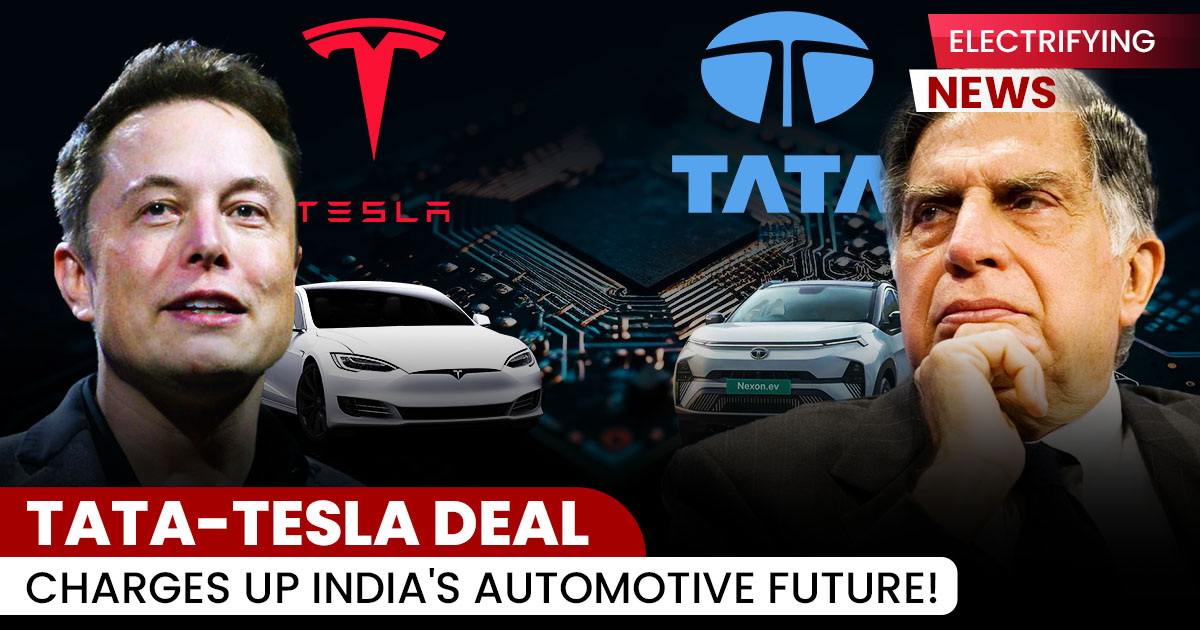Elon Musk’s Tesla has strategically partnered with Tata Electronics to source semiconductor chips for its global operations. The Tata Semiconductor deal is not just about expanding in the Indian market but also about securing a reliable supply chain.
The deal, executed secretly a few months ago, positions Tata Electronics as a reliable supplier for top-tier international clients. It is seeking to establish a crucial component of its semiconductor value chain within India.
Elon Musk’s visit to India could be a game-changer for the country’s electric vehicle manufacturing sector. The Tesla CEO is contemplating investments in this sector, which could potentially reach a staggering $2-3 billion.
About The Tata Semiconductor Deal:
Tesla, the world’s largest automotive company by market value, is ready to expand its operations in India, the fastest-growing prominent automotive market worldwide.
The US-based EV maker’s CEO and founder, Elon Musk, plans to visit India this month for the Tata Semiconductor deal. “I’m Looking forward to meeting with Prime Minister Narendra Modi in India!” Musk said on April 10 in a post on Twitter (X).
Elon Musk is expected to make crucial announcements during his visit to India. One of them is a firm commitment to fund facilities that manufacture electronic automobiles.
Ashok Chandak, president of the India Electronics and Semiconductor Association (IESA), said, “The major problem is local sourcing of semiconductors, and this requires advancement in the supply chain as value addition for the industrial and automotive components is much higher.”
Ashok Chandak also highlighted the potential benefits of Tesla’s decision to create a local supplier ecosystem for electronics and subsystems. The Tata Tesla Semiconductor deal demonstrates Tesla’s commitment to diversifying its supply chains. Also, not being overly dependent on a single market is a strategy that could significantly boost India’s automotive industry.
There is high anticipation that Tesla will invest approximately $2-3 billion in India to manufacture EV cars. It reflects the evolving interest in EVs within the country’s individual mobility market through the Tata Semiconductor deal.
Recently, policy adjustments have also facilitated automakers’ import of EVs priced above $35,000 at a lowered import duty rate of 15%. However, this right is subject to automakers engaging to invest $500 million within three years to establish manufacturing facilities in the country.
Tata Semiconductor Manufacturing In India
Tata Electronics has inaugurated semiconductor manufacturing facilities in three cities. The first semiconductor fab plant in India will be in Gujarat’s Dholera.
Chairman of Taiwan’s Powerchip Semiconductor Manufacturing Corporation (PSMC), Frank Huang, told the Economic Times in an interview that Dholera will mark its debut with 28-nanometer chips, which can be “further moved down to 22 nm.”
Additionally, the other two cities are Hosur (Tamil Nadu) and Assam. Tata Electronics plans to extend its operations into a well-integrated supply chain in India. Thus far, it has invested $14 billion in business operations.
Electric Vehicle Growth in India
Electric Vehicle sales in India are anticipated to grow 66% this year after almost doubling in 2023, according to the latest report by research firm Counterpoint.
Initially, Tata Tesla is likely to prioritize premium electric models. It will also consider local manufacturing of entry-level electric vehicles. Tata Electronics has boosted its workforce by hiring 50 to 60 top-level immigrants in recent months. It aims to expand its expertise in the Tata Semiconductor deal. Also, to further expand its technology and its design to improve business operations, as well as strategic planning.
Following the COVID-19 pandemic, Tesla has diversified its element sourcing beyond China for crucial electrical, electronic, and mechanical parts. Although Tesla keeps its supplier credentials secret and it manufactures specific electric components internally. These include chargers, electric motors, and battery packs while obtaining sub-assemblies and many other parts from worldwide suppliers.
What The Future Holds?
The Tata Semiconductor deal has the potential to be a turning point for India. It signifies an evolving recognition of India’s potential in the semiconductor area. It could pave the way for new investments and collaborations.
While detailed information about the agreement remains undisclosed, one thing is constant: The handshake between Ratan Tata and Elon Musk has sparked a sense of joy and excitement, and the whole world is eagerly waiting to see how this chip story unfolds.
Also Read: Top 12 Fastest Cars in The World 2024

